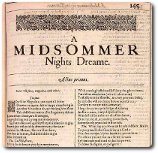The White Devil Contents
- Social / political context of The White Devil
- Religious / philosophical context of The White Devil
- The Theatre
Reign of Elizabeth I
A Golden Age
.jpg) The reign of Elizabeth I is often thought of as a Golden Age. It was a time of extravagance and luxury in which a flourishing popular culture was expressed through writers such as Shakespeare, and explorers like Drake and Raleigh sought to expand England's territory overseas. This sense of well-being was embodied by Queen Elizabeth, who liked to wear sumptuous costumes and jewellery and be entertained in style at her court.
The reign of Elizabeth I is often thought of as a Golden Age. It was a time of extravagance and luxury in which a flourishing popular culture was expressed through writers such as Shakespeare, and explorers like Drake and Raleigh sought to expand England's territory overseas. This sense of well-being was embodied by Queen Elizabeth, who liked to wear sumptuous costumes and jewellery and be entertained in style at her court.
Elizabeth I's reign
Elizabeth succeeded to the throne on her half-sister Mary's death in November 1558. She was very well-educated (fluent in six languages), and had inherited intelligence, determination and shrewdness from both her parents (Henry VIII and Anne Boleyn). Her reign (which lasted for 45 years) is generally considered one of the most glorious in English history.
Religion
During her reign a secure Church of England was established. Its doctrines were laid down in the 39 Articles of 1563, a compromise between Catholicism and Protestantism. Most of her subjects accepted the compromise as the basis of their faith, and her church settlement probably saved England from religious wars such as those from which France suffered in the second half of the sixteenth century.
Exploration
Elizabeth's reign also saw many brave voyages of discovery, particularly to the Americas. These expeditions prepared England for an age of colonisation and trade expansion.
Culture
 The arts flourished. Country houses were built, miniature painting reached its high point, theatres thrived - the Queen attended the first performance of Shakespeare's A Midsummer Night's Dream. Composers such as William Byrd and Thomas Tallis worked in Elizabeth's court and at the Chapel Royal, St. James' Palace.
The arts flourished. Country houses were built, miniature painting reached its high point, theatres thrived - the Queen attended the first performance of Shakespeare's A Midsummer Night's Dream. Composers such as William Byrd and Thomas Tallis worked in Elizabeth's court and at the Chapel Royal, St. James' Palace.
Elizabeth I's achievements
Investing in expensive clothes and jewellery (to look the part, like all contemporary sovereigns), the image of Elizabeth's reign is one of triumph and success. But her greatest achievement lay in the relationship she had forged with her people. She was ahead of her time in her grasp of public relations, and her popularity remained undimmed. In her Golden Speech of 1601 she declared:
Elizabeth was rewarded with loyalty and, enhanced by the glow of nostalgia, her own unique place in history. The Queen herself was often called 'Gloriana', 'Good Queen Bess' and 'The Virgin Queen'. The mourning which followed her death was unprecedented.
